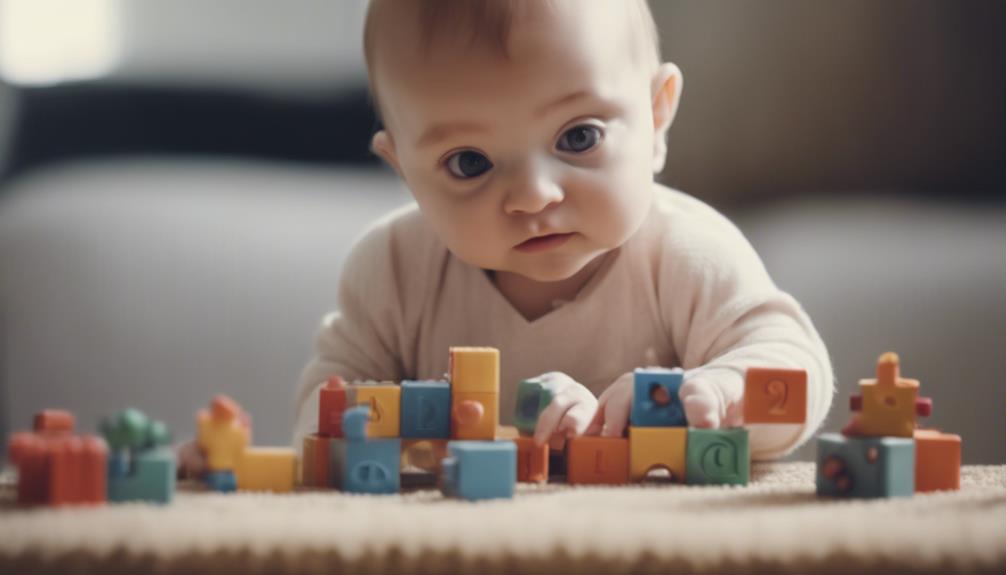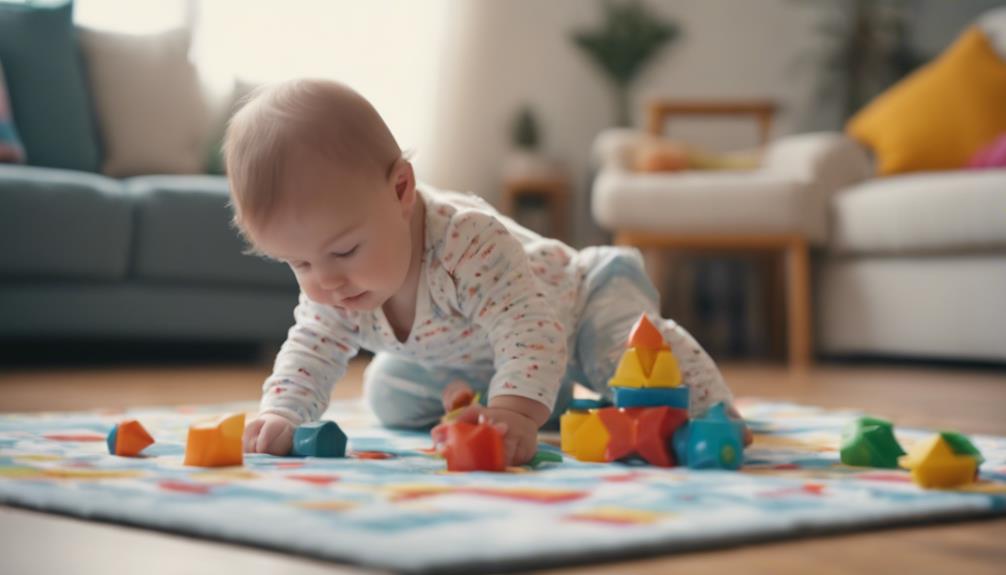To determine if your baby is advanced, pay attention to their early language skills such as forming sentences earlier than their peers. Observe their problem-solving abilities, including adaptive techniques and reaching milestones ahead of schedule. Keep an eye out for heightened curiosity, displayed through a thirst for knowledge and a desire to explore. Take note of creative play, such as imaginative role-playing and engaging with complex toys. Independence in activities, such as initiating tasks, is a promising indication. If your baby prefers playing alone and takes the initiative to learn, they may be advanced. Recognizing individual strengths and seeking guidance from professionals can offer valuable insights. Stay tuned for more tips on identifying advanced development in your baby.
Key Takeaways
- Observe rapid language development, advanced problem-solving skills, and heightened curiosity.
- Notice creative play, independence in activities, and a preference for solo play.
- Encourage initiative in learning and identify individual strengths early on.
- Seek consultation with child development specialists for valuable insights and guidance.
- Look for surpassing milestones, advanced interactions, and proactive engagement with learning tools.
Early Language Skills
To determine if your baby is advanced, observe their early language skills closely. Advanced communication abilities in babies may include early vocalization, following verbal directions, and forming sentences ahead of their peers. Look for signs of early language acquisition such as an interest in words, books, and a rapid growth in vocabulary.
Additionally, pay attention to your baby's social interaction skills like recognizing faces, making eye contact, and acknowledging familiar individuals. Babies with advanced language development may also display strong memory recall abilities.
Encouraging language development through reading, talking, and interactive play can further enhance your baby's communication skills. Providing a stimulating environment that fosters social interaction and language learning can help identify advanced language abilities in infants.
Problem-Solving Abilities

Babies with advanced problem-solving abilities exhibit quick problem-solving skills. They demonstrate innovative solutions and adaptive problem-solving techniques. They show persistence in overcoming challenges and often think outside the box, surpassing typical developmental milestones.
Stimulating tasks like mini-mazes can help identify and enhance their problem-solving skills. Encouraging their creative approaches further nurtures their advanced abilities.
Quick Problem-Solving Skills
Demonstrating advanced problem-solving skills, your baby exhibits a remarkable ability to tackle challenges with creativity and innovation. Advanced babies like yours show quick problem-solving abilities, using creative approaches and unconventional methods to find solutions.
Their persistence in overcoming obstacles and achieving goals sets them apart, showcasing cognitive abilities that go beyond their age. These babies display exceptional critical thinking skills, enabling them to analyze situations effectively and come up with innovative solutions.
Encouraging and supporting your baby's problem-solving efforts can further nurture their advanced problem-solving skills. By providing opportunities for them to explore, experiment, and think critically, you can help enhance their natural talent for finding unique solutions to problems.
Recognizing and celebrating your baby's quick problem-solving abilities can't only boost their confidence but also foster a lifelong love for learning and overcoming challenges.
Innovative Solutions Demonstrated
From an early age, your advanced baby consistently showcases their ability to provide innovative solutions to various problems. These babies exhibit unconventional problem-solving techniques that go beyond what's typically seen in their peers.
They demonstrate remarkable persistence in solving challenges and finding creative approaches to obstacles they encounter. Their early development of critical thinking skills sets them apart in their problem-solving abilities.
Encouraging and nurturing your baby's innovative problem-solving skills can help them thrive and continue to excel in this area. By providing opportunities for them to explore different ways of approaching problems and challenges, you can further support their natural inclination towards finding unique solutions.
Celebrate their successes and encourage them to keep honing their problem-solving abilities through various activities and tasks. With your guidance and support, your advanced baby is sure to continue impressing you with their innovative problem-solving skills.
Adaptive Problem-Solving Techniques
When faced with challenges, advanced infants showcase remarkable persistence and ingenuity in developing adaptive problem-solving techniques. These infants exhibit advanced problem-solving abilities by demonstrating a level of persistence that sets them apart from their peers.
They often come up with innovative and creative solutions to problems, showing a unique ability to think outside the box. Introducing tasks like mini-mazes can further enhance their problem-solving skills, providing them with opportunities to practice and refine their techniques.
It is important for parents and caregivers to cheer on and support these babies' efforts in problem-solving. Doing so not only boosts their confidence but also motivates them to continue exploring and learning.
Advanced problem-solving skills in babies serve as an important indicator of their cognitive development and intelligence, laying a solid foundation for their future growth and success. By nurturing these adaptive problem-solving techniques, caregivers play a significant role in helping these infants reach their full potential.
Heightened Curiosity

Heightened curiosity in advanced babies is often displayed through their insatiable desire to explore and learn, showcasing their exceptional cognitive abilities. Infants with advanced intelligence exhibit a keen enthusiasm to interact with their environment, demonstrating a thirst for knowledge and understanding from a very early age.
They may show a strong desire to explore their surroundings, engaging in activities that stimulate their cognitive development and promote their curiosity. This heightened curiosity can manifest as a deep interest in books, toys, and learning tools, reflecting their advanced cognitive abilities and potential giftedness.
Curious babies often ask complex questions and seek out new information, displaying a drive for exploration that sets them apart in terms of cognitive development. Observing and nurturing this curiosity in infants can play a significant role in fostering their intellectual growth and encouraging their innate abilities.
Creative Play

Engaging in creative play with your advanced baby can greatly enhance their cognitive development and foster a range of essential skills. Creative play involves activities such as building with blocks, drawing, and imaginative role-playing, which can help in developing problem-solving skills and emotional expression.
By encouraging open-ended play without strict rules, you provide a platform for your baby to stimulate their creativity and innovation. Advanced babies often show a preference for complex toys that challenge their imagination, further boosting their cognitive abilities.
Through creative play, your baby can also enhance their communication and social skills, as they learn to interact with others and express themselves. So, consider incorporating various forms of creative play into your baby's routine to support their overall development and provide them with opportunities to explore, learn, and grow in a fun and engaging way.
Independence in Activities

If your baby is showing early signs of independence in activities like feeding themselves or attempting to dress on their own, they may be advanced.
When babies start trying to accomplish tasks without constant help, it could indicate a strong desire for autonomy and initiative in completing simple tasks independently.
Encouraging their independence can help boost their self-confidence and enhance their overall development.
Early Self-Care Skills
Look for signs of early self-care skills in your baby, such as feeding themselves or attempting to dress independently. Advanced babies may also show interest in toileting routines and try to mimic adult behaviors.
Encouraging independence in activities like brushing teeth or washing hands can help foster self-care skills from a young age. Observing your child's ability to follow simple self-care instructions can be an indication of advanced development in this area.
Pay attention to early attempts at organizing personal belongings or showing interest in daily routines for signs of advanced self-care skills. By providing opportunities for your baby to practice these self-care tasks, you're helping them build important life skills that promote independence and confidence.
Solo Play Preferences
Babies demonstrating a preference for solo play may exhibit advanced independence in activities early on. Enjoying solitary playtime can be a vital inclination indicating your baby's interest in individual exploration and self-discovery. Providing intellectual stimulation during these moments of solitary play can further enhance their cognitive growth. It's important to strike a balance between allowing your baby to engage in solitary activities and encouraging social interactions to support their holistic development. By respecting your baby's inclination for alone time, you're fostering their independence and nurturing their sense of individuality.
As your baby engages in solo play, they're likely seeking intellectual stimulation that can contribute to their cognitive development. Embracing their preference for solitary activities not only encourages self-discovery but also promotes a sense of independence from an early age. Remember that solo play is a valuable part of your baby's development and can provide them with the space they need to grow and learn at their own pace.
Initiative in Learning
When observing your baby's behavior, notice their independent exploration of toys and activities to determine if they show initiative in learning. Advanced babies exhibit a proactive approach by engaging with objects and seeking out new experiences. These babies may demonstrate early independence in learning activities, such as feeding themselves or trying out new tasks.
Initiating interactions with toys, books, or other objects is a clear sign of their proactive learning style. Encouraging this early independence can help nurture their advanced skills and abilities. By fostering a supportive environment that allows your baby to explore and learn on their own, you're helping them develop a strong foundation for future learning.
Remember to provide a variety of stimulating and age-appropriate toys and activities to keep your advanced baby engaged and excited about learning new things.
Individual Strengths

Identifying your baby's individual strengths can be achieved by observing early signs of intelligence, such as strong memory recall and intense curiosity. Keep an eye out for advanced cognitive abilities like problem-solving skills and innovative solutions.
Notice if your baby displays emotional intelligence through intense emotions, strong connections with others, and mature thinking. Pay attention to developmental milestones, such as early sitting up, advanced grasping, and quick overall growth.
Additionally, consider physical indicators of intelligence, like high birth weight, which has been linked to higher intelligence and academic success. By observing these characteristics, you can gain insight into your baby's unique strengths and abilities.
Remember that every baby develops at their own pace, so celebrate and nurture the individual strengths that make your little one special.
Consultation With Professionals

Engaging with professionals in child development can offer valuable insights into your baby's advanced development. Consultation with child development specialists allows for a thorough assessment of your baby's milestones, behaviors, and cognitive abilities to determine if they exhibit advanced traits.
By observing and documenting your baby's unique skills and behaviors, professionals can gain a better understanding of their advanced development. Early intervention and guidance from experts can effectively support your baby's advanced abilities, providing recommendations and strategies to nurture and enhance their skills.
These professionals can offer tailored advice on how to best encourage and stimulate your advanced baby, ensuring they reach their full potential. Seeking consultation with experts in child development can provide you with the necessary tools and knowledge to support your baby's growth and foster their advanced development successfully.
Frequently Asked Questions
How to Identify a High IQ Baby?
To identify a high IQ baby, watch for early signs of intelligence like eye contact and responsiveness. Look for advanced communication skills such as early vocalization and following directions. Notice emotional intelligence and quick developmental milestones indicating cognitive abilities.
At What Age Does Giftedness Appear?
Giftedness can emerge as early as infancy. Keep an eye out for advanced behaviors and milestones. Early recognition helps parents offer suitable support. Remember, giftedness isn't just about age but exceptional abilities.
How Do I Know if My Baby Is Developing Well?
You can tell if your baby is developing well by observing milestones like eye contact, vocalization, and sitting up. Watch for signs of intelligence, communication skills, emotional intelligence, and problem-solving abilities to gauge their progress.
How Can You Tell if a Baby Is Thriving?
You can tell if a baby is thriving by observing their exceptional focus, problem-solving skills, preference for solitude or social interaction, and curiosity. These traits showcase your baby's advanced development and intelligence.
Conclusion
To sum up, should you find your little one displaying advanced qualities in their development, it may be worth considering seeking guidance from professionals in the field.
Embracing their unique strengths and supporting their growth can lead to endless possibilities in their future endeavors.
Remember, every child progresses at their own pace, so celebrate their achievements no matter how big or small.










